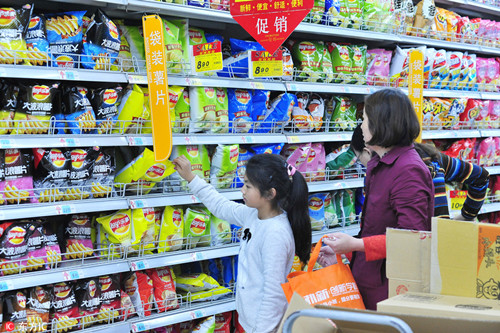Inflation increases, but sharp rise seen as unlikely with signs 'stable'


Consumers do shopping at a supermarket in Nanjing, East China's Jiangsu province, Oct 16, 2018. [Photo/IC]
Despite short-term fluctuations, China's consumer inflation remains stable, and a broad rise in prices is not likely in the coming months, according to senior officials at the nation's top economic regulator.
"The current price inflation level remains stable, and no signs have appeared to indicate a continued rise of inflationary pressure," said Meng Wei, a spokeswoman for the National Development and Reform Commission, during a news conference on Wednesday. "While inflation might be affected by seasonal and other short-term factors, the overall price level is expected to remain largely stable."
China's consumer price index rose 2.5 percent in September from a year earlier, accelerating for a fourth consecutive month, with food prices jumping the most since February, according to the National Bureau of Statistics.
On a monthly basis, consumer prices went up 0.7 percent in September.
Food prices, which account for a large proportion of the consumer inflation weighting, went up by 3.6 percent from the same month last year.
Overall, inflation is not likely to rise sharply, according to an official at the inflation data monitoring department who asked not to be identified.
Looking ahead, pork prices, a major component of food prices, may be driven up in the November to December period as demand could increase in winter, but the increase is not likely in all regions, making its contribution to overall inflation insignificant, according to the official.
To cushion possible external shocks on domestic prices, the country will broaden import channels and ensure the amount of soybeans in reserves is at a proper level, as part of its efforts to guarantee the supply of the commodity, the official said.
Those comments came amid some worries that food prices could be pushed up by adverse weather and ongoing trade frictions with the United States, while the economy faces some level of downward pressure.
"We see limited room for inflation trending up," economists at China International Capital Corp said in a research note.
That is because major factors pushing up prices are seasonal. Some moderate relaxation of environmental enforcement since mid-September may weaken pressure on industrial production, they said.
As for concerns about pressure from escalating Sino-US trade frictions, which would lead to an increase in the price of soybeans and other imported commodities, the impact may still be marginal because the country can increase imports from other nations to offset the risks, they said.
MOST POPULAR
- 1 $39.7 billion worth of deals inked at Airshow China
- 2 China announces tax relief measures to stabilize real estate sector
- 3 A look at China's economy in October, 2024
- 4 Public holiday extension announced
- 5 China's NEV annual production hits 10 million milestone amid global carbon reduction efforts
Editors' Picks
 Infographic:
A look at China's economy in October, 2024
Infographic:
A look at China's economy in October, 2024
 Infographic:
G20 at a glance
Infographic:
G20 at a glance
 Video:
Peru sees new port open
Video:
Peru sees new port open
 Infographic:
China's public holidays for 2025
Infographic:
China's public holidays for 2025
 Infographic:
Basic facts of APEC
Infographic:
Basic facts of APEC


